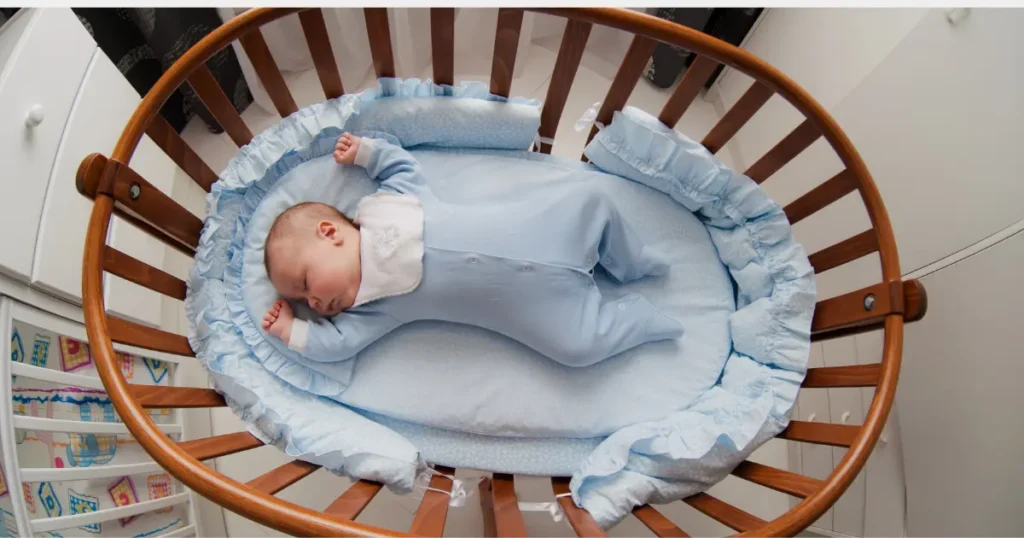
Tired moms! If you are reading this, chances are high that you are looking out for a sick baby to sleep.
You are not alone in this parenting journey of challenges that come with a sick baby who refuses to sleep.
Tips to help a sick baby to sleep
Understanding the baby Struggle
Imagine this: it is 3’o clock in the morning, and you need help a sick baby to sleep, who is wide awake, fussing and refusing to drift off into their dreamland. We have all been there in that situation, and it’s tough.
The key here is to first understand why your baby might be having trouble sleeping. It could be discomfort from illness, teething, or just general fussiness. Identifying the root cause is the first step in providing the right solution.

Creating a Comfortable Sleep Environment
One of the best things you can do for a sick baby to sleep is to create a cozy and comforting sleep environment. Think of it as crafting a little haven of tranquility for your toddler.
Dim the lights and play some soft lullabies to hear, and make sure the room is at a comfortable humidity level. Remember, a relaxed environment can work wonders in lulling your baby into a peaceful sleep.

Comforting Techniques
There are also few hands-on techniques to comfort a sick baby to sleep. A warm bath can be incredibly help in soothing the baby. Not only does it help regulate body temperature, but it also provides a sense of calmness for your little ones.
Additionally, you can try incorporating gentle massage using baby-safe oils. This not only relaxes your baby’s muscles but also fosters a sense of security.

The Power of Snuggles
Also Never underestimate the power of a good snuggle! Sometimes, all your baby needs is the warmth and comfort of being close to you. Consider using a baby carrier or snuggling up in bed together. The closeness can be incredibly reassuring for your little one and might just be the secret ingredient to coax them into slumber.

Feeding and Hydration
Ensuring your sick baby is well fed and hydrated. If they don’t have the required daily appetite it will get difficult for a sick baby to sleep, so offering smaller, more frequent feeds can be beneficial.

Natural Remedies
Few natural remedies that helps in the process are like a few drops of lavender oil on a cloth near the crib which can create a calming atmosphere for your baby. Also a cool humidifier, it can help in easing congestion, making it easier for your baby to breathe. Always consult with your pediatrician before using any essential oils, especially on infants.

Seek Professional Help
We always advise for trusting your ideas. If you’ve tried these remedies and still struggling to make sick baby to sleep , it is time to pick up the phone and call your healthcare provider. It is better to address concerns early on rather than letting them to escalate further.

Conclusion
Remember navigating the process of making sick baby to sleep is tough, your dedication to your little one’s well-being is truly commendable.
By creating a soothing sleep environment, offering comfort through various techniques, and utilizing natural remedies, you are well on your way to helping your sick baby find the rest they need.
Also Read: 10 Proven Wellness Activities For Students
FAQ
Why Sick baby won’t sleep unless held?
Yes, it is a normal situation when they are feeling under the weather. Your comforting touch provides them the security and warmth for which they are craving for during these tough times. It is like having a cozy security blanket but in the form of love from mom or dad!
Sometimes, it is tough for a sick baby to sleep; they need extra love and reassurance from parents. Give those extra cuddles, and let them feel the comfort of your hug. It is a temporary phase, and soon they will be back to normal.

How to get overtired sick baby to sleep?
First things first, do create a cozy sleep zone with dim lights and soothing music. Next, try a warm bath to ease the tension.
Think of it as a mini spa day for your baby. If all else fails, embrace the power of your comforting cuddles. Sometimes, a extra bit of love is the best remedy.
Sick baby won’t sleep dilemma is everywhere! Imagine your baby as a tiny superhero, fighting off those nasty germs.

Why sick baby waking every 20 minutes?
If you are trying to make a sick baby to sleep and waking up every 20 minutes is like a sleep marathon with hurdles. Imagine this scenario as a little sleep disco night where your sick baby is the DJ.
Spinning the wake up track frequently than you would like. Check the room vibes and make it cozy, dim, and just right.
Check if the baby has any discomfort – is the diaper comfy or anything uncomfortable while sleeping?
How can I help my toddler sleep when sick?
You are navigating through a tough phase, challenging but it is doable. First, hold them in your hands and walk for a while, like building a fortress of comfort in your hands.
Hydrate your babies at regular intervals. Consider placing a humidifier for extra comfort which adds a gentle breeze to their sleep sail.
And do not forget the cuddles with your magic touch which can do wonders. Think of it as a sleep spell, making bedtime a magical, restful experience.
Best sleeping position for sick baby?
Here are a few recommended sleeping positions for a sick baby:
Back Sleeping Position: Placing your baby on their back is generally recommended by experts, especially when they are sick.
This position helps ensure clear airways and reduces the risk of choking.
Elevated Head Position: Consider slightly elevating the head of the crib mattress. This can aid in easing congestion and promoting better breathing for your baby, similar to propping yourself up with pillows when you have a cold.
Cradled in Your Arms: Sometimes, the best place for a sick baby is in your arms. Holding your baby in a slightly upright position can provide a level of comfort and help with breathing.
Customized Pillow Support: For older infants and with the guidance of your pediatrician, strategically place small pillows or a rolled-up blanket can provide gentle support to ease discomfort.
Side Car Bassinet: Attach a bassinet or crib to the side of your bed. This allows your baby to be close to you and easy monitoring while maintaining a safe sleep space.
Always consult with your pediatrician before making significant changes to your baby’s sleeping routine, especially if they are sick or have any health concerns.

